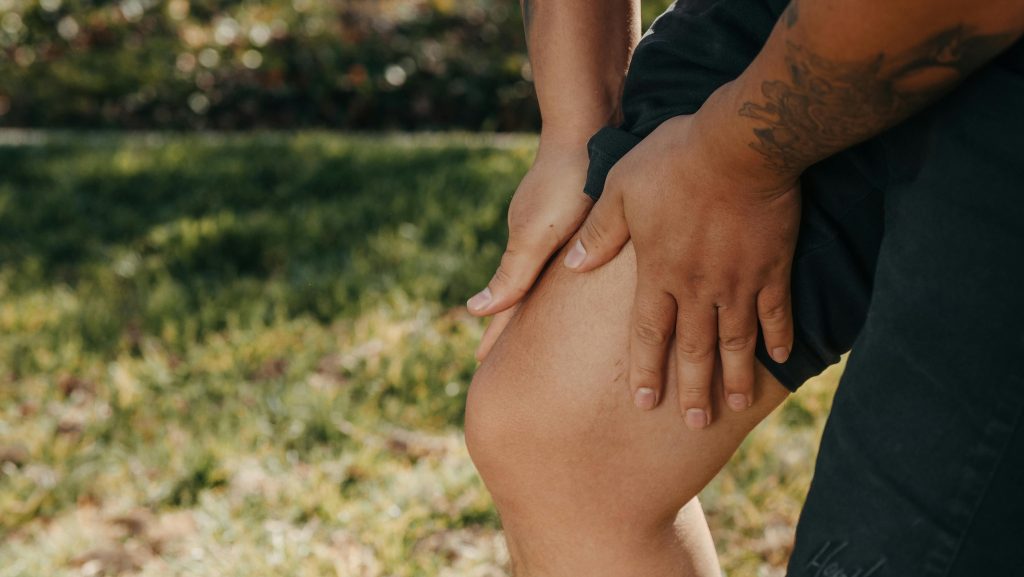GP Dr Donald Grant – The difference between morning and evening joint pain and how best to manage it
Arthritis and other joint conditions cause pain and stiffness in the joints and affect 17 million people in the UK.
 This includes an estimated 10 million people with osteoarthritis (OA), of which 5.4 million have knee OA and 3.2 million have hip OA. Approximately 450,000 adults have rheumatoid arthritis (RA), and 190,000 adults are estimated to have psoriatic arthritis.
This includes an estimated 10 million people with osteoarthritis (OA), of which 5.4 million have knee OA and 3.2 million have hip OA. Approximately 450,000 adults have rheumatoid arthritis (RA), and 190,000 adults are estimated to have psoriatic arthritis.
There’s also some evidence to suggest that changes in hormones during the onset of menopause can trigger a form of ‘menopausal arthritis’ in women whereby joints become more inflamed and less mobile due to the sudden drop in female sex hormones. This type of arthritis can improve post-menopause or with the administration of HRT.
Another form of arthritis is ‘reactive arthritis’, which is a type of temporary arthritis triggered by infections in another part of the body, most often the intestines, genitals or urinary tract. Food poisoning (salmonella) along with bacterial infections such as shingles and the sexually transmitted bacteria Chlamydia are common triggers for reactive arthritis and for chlamydia it is more common in men than women.
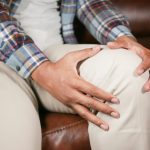 This condition, which can often affect younger people, usually causes quite a rapid onset of inflammation and stiffness in the joints in the knees, ankles and feet with symptoms usually disappearing within 12 months.
This condition, which can often affect younger people, usually causes quite a rapid onset of inflammation and stiffness in the joints in the knees, ankles and feet with symptoms usually disappearing within 12 months.
Despite differing causes of joint pain, treatments for it are often similar in the form of pain-relieving medications (NSAID’s) and topical pain-relieving treatments. There is rising concern about long-term use of NSAID’s because they come with a list of negative side effects, so the use of alternative and non-drug forms of joint pain relief to reduce reliance on medicated pain relief are generally encouraged as much as possible.
However, there’s a difference between the type of joint pain often experienced in the mornings and joint pain experienced in the evenings.
Knowing the difference can help sufferers tailor their joint pain management treatments more effectively.
With the help of Bristol-based GP Dr Donald Grant here’s some suggestions on how to best manage morning and evening joint pain.
Morning Joint Pain
Morning joint pain tends to be more about stiffness and lack of mobility. This is due the amount of synovial fluid circulating around the joint being depleted and also thickening due to lack of movement during sleep.
For people who suffer from osteoarthritis (OA), this morning stiffness may also be added to from a breakdown in the cartilage that covers the ends of the bones.
Morning stiffness from OA is often quite short-lived, usually easing within approximately 30 minutes. For those with rheumatoid arthritis (RA) it may linger for longer.
How to ease morning joint pain
Managing morning joint pain should focus on aiding joint lubrication as much as possible.
Apply a joint lubricating cream to morning bed joints
Topical preparations that are focused more specifically on joint lubrication can be effective for morning joint stiffness as these can help relieve the feeling of lack of mobility more quickly.
Applying topical joint lubricating preparations 20-30 minutes before getting up while you are still warm in bed can aide the process even more.
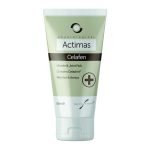 Actimas Celafen (www.actimas.co.uk), contains a specific long-chain fatty acid preparation which has been shown to aide in joint lubrication and is proven to take effect within 30 minutes of application.
Actimas Celafen (www.actimas.co.uk), contains a specific long-chain fatty acid preparation which has been shown to aide in joint lubrication and is proven to take effect within 30 minutes of application.
GP Dr Donald Grant, “There’s good evidence for the efficacy of long chain fatty acids in preparations such as Celafen for the treatment of chronic joint stiffness.”
Do a gentle bed stretching routine
Before getting out of bed, do some gentle stretching for 5-10 minutes while you are still warm under the covers. Start with gently doing wrist and ankle circles. Then bend your knees. Gently lift one hip and then the other off the bed and slightly rotate it upwards. Turn onto your front and stretch your arms gently forward with your knees in a kneeling position to stretch out your lower back. Gently rotate your head clockwise and then anticlockwise.
Have A Warm Shower
 The warmth of the shower can help further relieve stiff joints by boosting circulation to the joints. Put on a pre-warmed bath robe after showering to continue to keep morning joints warm.
The warmth of the shower can help further relieve stiff joints by boosting circulation to the joints. Put on a pre-warmed bath robe after showering to continue to keep morning joints warm.
Drink Plenty of Hydrating Warm Liquids
 Drinking warm teas such as ginger and turmeric or warm water with lemon helps quickly hydrate the body. Drink at least two glasses or mugs of these before having a morning coffee.
Drinking warm teas such as ginger and turmeric or warm water with lemon helps quickly hydrate the body. Drink at least two glasses or mugs of these before having a morning coffee.
Eat A Joint-Lubricating Breakfast
 Omega oils are found in the richest sources in oily fish but are also found in seeds and nuts. Eating an omega-rich meal is ideal for breakfast to help speed up the lubrication of stiff morning joints. Tinned sardines, mackerel or herring, smoked salmon, sunflower seeds, flaxseeds and chia seeds, nut milks and butters (in particular walnuts) and omega 3 enriched eggs are some of the highest food sources of omega oils.
Omega oils are found in the richest sources in oily fish but are also found in seeds and nuts. Eating an omega-rich meal is ideal for breakfast to help speed up the lubrication of stiff morning joints. Tinned sardines, mackerel or herring, smoked salmon, sunflower seeds, flaxseeds and chia seeds, nut milks and butters (in particular walnuts) and omega 3 enriched eggs are some of the highest food sources of omega oils.
Consider adding joint-lubricating supplements with breakfast
Adding omega oil supplements along with glucosamine and chondroitin to your morning routine can help with lubricating joint cartilage and many studies have shown that chondroitin helps reduce joint stiffness.
Evening joint pain
Joint pain experienced at night can be brought on by chronic conditions such as all types of arthritis, ankylosing spondylitis and fibromyalgia.
What usually characterises evening joint pain is inflammation. Joint pain at night often feels achy and sore, creating a burning or throbbing sensation.
Repeated use and strain on joints during daily tasks mean that in the evenings joint swelling spikes.
At night levels of cortisol (your anti-inflammatory hormone) dips, while pro-inflammatory proteins like cytokines surge. For arthritis and joint-pain sufferers, this means swelling and pain ramp up. In addition, production of the hormone prolactin spikes which while aiding sleep, also increases inflammation.
Nerve pain that is typical of fibromyalgia can be felt more at night and can manifest itself as tingling, or ‘pins and needles’.
Body temperature changes in the evenings are also a possible cause of nerve pain, because experts believe that when the temperature drops at night, damaged nerves may interpret the change as pain or tingling.
How to ease evening joint pain
Managing evening joint pain needs to focus principally on reducing inflammation as effectively as possible. If an evening pain flare is particularly bad, then it may be necessary to use NSAID medication that are available on prescription.
However, its widely agreed that trying to limit the use of these medications via alternative methods is preferable due to their side effects.
Dr Grant says, “Anything that can lower the reliance and habitual use of conventional painkillers is a bonus because they so often do carry negative side effects for many patients using them on a long term and regular basis.
It’s also worth bearing in mind that studies looking at the value of Paracetamol and Ibuprofen in the treatment of arthritis could not reliably conclude whether Paracetamol was better than Ibuprofen or whether either was better than nothing at all for ‘arthritic’ pain. Research published in the British Medical Journal concluded that long term use of non-steroidal anti-inflammatory medications, commonly prescribed in the UK for arthritic type pain, were only slightly better than placebo.
So, taking these studies into account, it’s questionable if conventional painkillers even work that well on joint inflammation yet they carry many common side effects which are not very pleasant for the patient.”
Apply an anti-inflammatory joint cream to evening joints
Essential oil preparations with anti-inflammatory actions can be effective for bringing down evening joint inflammation.
Boswellia (frankincense) has been widely studied for the use of joint inflammation as it contains pant chemicals called Boswellia acids, which have anti-inflammatory effects. Commiphora (Myrrh) has also been widely studied for its anti-inflammatory effects on joint inflammation.
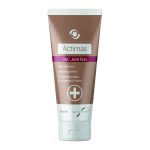 Actimas Boswellia & Commiphora Joint Rub (www.skinshop.co.uk) contains both these essential oils in high concentrations and has been shown in two studies by UK doctors as well as wider scientific studies to help quickly relieve the pain from joint inflammation.
Actimas Boswellia & Commiphora Joint Rub (www.skinshop.co.uk) contains both these essential oils in high concentrations and has been shown in two studies by UK doctors as well as wider scientific studies to help quickly relieve the pain from joint inflammation.
Dr Grant, who carried out one of the studies says. “Both extracts of frankincense and myrrh have a solid bank of published research on their anti-inflammatory activity, and there’s some specific research on their anti-inflammatory action on arthritic joint swelling.
The resin extracted from frankincense contains acids which inhibit pro-inflammatory enzymes, and in particular, one of these acids is the most potent inhibitor of 5-lipoxygenase, an enzyme responsible for inflammation.
Myrrh has also been widely studied for both its anti-inflammatory and analgesic effects.
By combining these two spices together in a formula we’ve got a potent anti-inflammatory action, as my study showed, with no negative side effects. This is exactly what’s needed when dealing with evening joint inflammation.”
Put your feet up
 Elevation of the feet is a simple way to help reduce swelling in the knees and feet because it slows blood flow and fluids to the affected area which can help ease inflammation.
Elevation of the feet is a simple way to help reduce swelling in the knees and feet because it slows blood flow and fluids to the affected area which can help ease inflammation.
Keep shoes on until you sit down
 Standing with your feet can make evening joint inflammation worse.
Standing with your feet can make evening joint inflammation worse.
One way to minimize this is to wear comfortable, supportive shoes in your house as bare feet can intensify pain. Consider buying a supportive pair of shoes or slippers for indoor use only.
Adding a cushioned mat in front of the stove or sink can also help reduce pressure on your leg and foot joints while doing kitchen chores and cooking.
Use a cooling compress
Joint inflammation often causes additional heat so using a cooling compress on swollen even joints while also elevating them can help bring down inflammation.
Drink anti-inflammatory drinks and avoid alcohol
Green tea is well known for its anti-inflammatory effects so drinking it in the evenings can help, although avoid drinking it last thing before bed as it contains caffeine, although relatively low levels, approximately 29 milligrams (mg) per cup, compared with black tea, which has 48 mg per cup, and coffee, which has 96 mg per cup.
Studies have also found that tart cheery juice contains compounds that can modulate inflammatory signalling pathways, helping to reduce inflammation in the joints.
 Alcohol, on the other hand, can increase inflammation because when the body breaks it down it releases inflammatory proteins. Also, some studies have shown that alcohol reduces levels of anti-inflammatory bacteria in the gut.
Alcohol, on the other hand, can increase inflammation because when the body breaks it down it releases inflammatory proteins. Also, some studies have shown that alcohol reduces levels of anti-inflammatory bacteria in the gut.
Avoid inflammatory foods at night
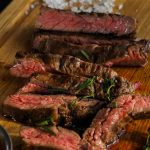 Food which can increased inflammation in the body include highly processed foods, sugary foods, refined grains like white bread and rice and saturated fats in red meat and full fat dairy products, so try to avoid or reduce the amounts all of these for your evening meal.
Food which can increased inflammation in the body include highly processed foods, sugary foods, refined grains like white bread and rice and saturated fats in red meat and full fat dairy products, so try to avoid or reduce the amounts all of these for your evening meal.
Take MSM with dinner
Methylsulfonylmethane (MSM) has been shown to have anti-inflammatory effects. One study found that taking an MSM supplement with dinner help, over time, reduce inflammation of the knee joints overnight.
- GP Dr Donald Grant


